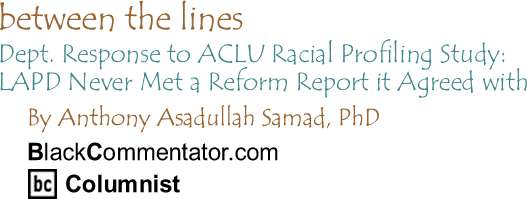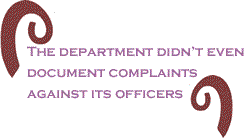
|
|||||||||||||||||||||||

|
|||

Custom Search
|
|||
 |
|||
The nation’s most abusive, and aggrieved law enforcement agency, the Los Angeles Police Department, is still “doin’ what it do” as it presented its response this week to a racial profiling study released to its civilian Police Commission in October, 2008. The study, titled, “Racial Profiling & The LAPD,” documents that deep and pervasive racial profiling practices still exist in the police department, despite that fact the LAPD is still under a federal consent decree to reform its historical abuse and misconduct practices. The study said that Africans Africans were three times as likely to be stopped than their white or Latino counterparts, five times as likely to be arrested than their white counterparts (three times as much Latinos were arrested), and almost twice as likely to be cited than anybody else in the city. LAPD still sees black when they see drivers, though black population in Los Angeles continues to shrink (now eight percentage of the city’s population). However, our Latino counterparts are finding out more increasingly what it’s like to be stopped for “driving while black,” though they are the most frequent drivers at fifty percent of the city’s population. According to the study, the “b” is “DWB” stands for black AND brown. The department’s response could be expected. For LAPD, the response is always the same; object to the report, then offer a passive response. Guilty or not, LAPD never met an external evaluation of the department that it could agree with, or that it liked. The LAPD’s response report called, “The Prevention of Biased Policing,” essentially dismisses its own data under the assertion that you can make statistics say anything - even when they’re your own statistics - and asserts that its current methods are sufficient to address the issue. LAPD has a history of refuting what is obvious to everybody else. The ACLU report was comprehensive, empirical in its data (not anecdotal, as LAPD has claimed in the past), scientifically objective (not subjective) and significantly conclusive. Yet, the LAPD continues to tell the public that racial profiling is just “perception, not reality.”
LAPD deals in selective engagement when it comes to numbers. They’re
quick to use numbers or statistics when the numbers favor the department,
as when crime rates drop, or when the number of recruits or officers
on the street is up. The numbers are reliable then. But when they
point to the department’s deficiencies as it relates to the department’s
historical problem, it’s always, “No, that can’t be right.” Well,
the numbers are right and LAPD needs to stop and acknowledge that.
The LAPD doesn’t have to like the report to admit it is correct.
There was a time when the department could “rope a dope” the public when criticism came their way. They did it for nearly forty years, since the McCone Commission issued the first real assessment of police practices in December, 1965. While the City of Los Angeles started the Human Relations Commission in January, 1966, LAPD literally ignored the McCone Commission recommendations. In the three decades to follow, LAPD rose to its all-time corruption level, in all its racist and “blue code” glory. The April, 1992 rebellion forced LAPD to face up to its abuse and misconduct culture, and even then, the department resisted external scrutiny until a federal consent decree was imposed upon it, and an inspector general was posted in the department to provide oversight. At the time, the department didn’t even document complaints against its officers. Then, when the issue of racially biased policing was raised ten years ago, the department resisted collecting racial data and had to be forced to do it. After the worse corruption scandal in the department’s history (Rampart), the department agreed to take complaints and collect racial data. Last year, the department reported that in over 1,200 complaints against
LAPD officers, not one had validity. Even LAPD Commissioner, John
Mack, had to say, “C’mon now?” Now LAPD wants to tells us that its
racial profiling problem and the black and brown disparities that
exist are consistent with other departments and that trips to the
museum of tolerance for officer trainees (along with a few other
classes) is enough, and that statistics shouldn’t dictate policy
as it relates to implementing stronger reforms against racial profiling.
LAPD played itself true to form. Despite the facts, it still wants to
deny racial profiling exists in any extreme measure. BlackCommentator.com Columnist, Dr. Anthony Asadullah Samad, is a national columnist, managing director of the Urban Issues Forum and author of Saving The Race: Empowerment Through Wisdom. His Website is AnthonySamad.com. Click here to contact Dr. Samad. |
|||
Any BlackCommentator.com article may be re-printed so long as it is re-printed in its entirety and full credit given to the author and www.BlackCommentator.com. If the re-print is on the Internet we additionally request a link back to the original piece on our Website. Your comments are always welcome. eMail re-print notice
If you send us an eMail message we may publish all or part of it, unless you tell us it is not for publication. You may also request that we withhold your name. Thank you very much for your readership. |
|||
| |
|||






























 LAPD
abuse and misconduct has always been a figment of our (black people’s)
imagination, according to them. Now it must be a figment of the
Latino community’s imagination also. Not when Blacks and Latinos
are 166% and 132% (respectively) more likely than whites to be asked
to step out of the car, not when Blacks and Latinos are 127% and
43% (respectively) more likely than whites to be “frisked,” not
when Blacks and Latinos are 81% and 77% (respectively) more likely
than whites to be subjected to a nonconsensual search. It is NOT
a figment of either the black or Latino community’s imagination.
The numbers speak for themselves.
LAPD
abuse and misconduct has always been a figment of our (black people’s)
imagination, according to them. Now it must be a figment of the
Latino community’s imagination also. Not when Blacks and Latinos
are 166% and 132% (respectively) more likely than whites to be asked
to step out of the car, not when Blacks and Latinos are 127% and
43% (respectively) more likely than whites to be “frisked,” not
when Blacks and Latinos are 81% and 77% (respectively) more likely
than whites to be subjected to a nonconsensual search. It is NOT
a figment of either the black or Latino community’s imagination.
The numbers speak for themselves.
 Meanwhile,
what the department doesn’t say is that these disparate numbers
exist despite the fact that the department has technology that scans
license plates, watches officers (cameras in cars) and early detection
systems (on officer behaviors) that still haven’t mitigated the
problem. They would rather attack the critique instead.
Meanwhile,
what the department doesn’t say is that these disparate numbers
exist despite the fact that the department has technology that scans
license plates, watches officers (cameras in cars) and early detection
systems (on officer behaviors) that still haven’t mitigated the
problem. They would rather attack the critique instead.